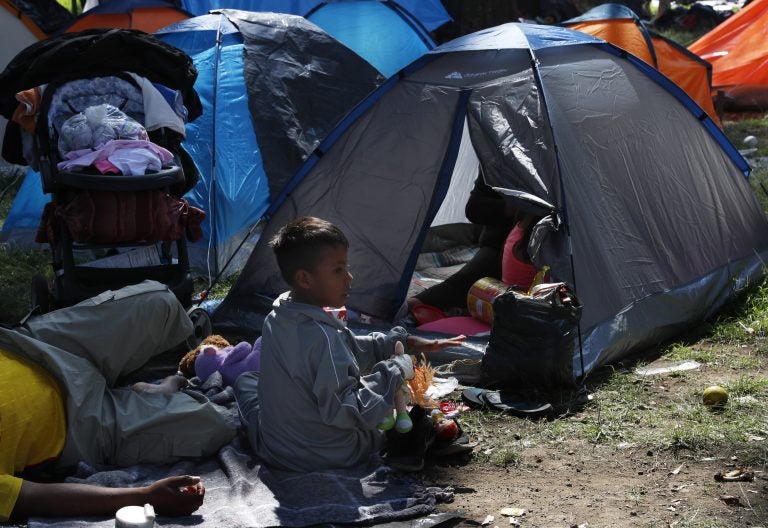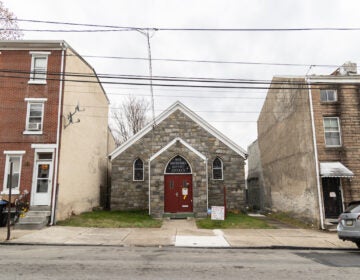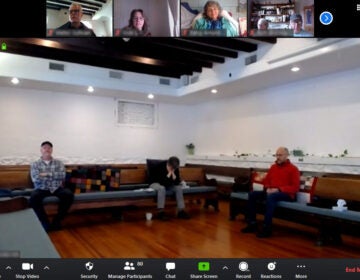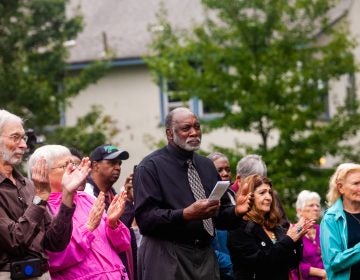Quaker relief worker recounts helping migrants in caravan get through Mexico
A member of the Philadelphia-based American Friends Service Committee recounts her experiences doing relief work with the caravan of migrants passing through Mexico.

A migrant child sits outside a tent, taking shelter at the Jesus Martinez stadium in Mexico City, Tuesday, Nov. 6, 2018. Humanitarian aid converged around the stadium in Mexico City where thousands of Central American migrants winding their way toward the United States were resting Tuesday after an arduous trek that has taken them through three countries in three weeks. (Marco Ugarte/AP Photo)
Philadelphia-based American Friends Service Committee has workers on the ground in Mexico, helping the caravan of refugees fleeing Guatemala to seek asylum in the United States.
An 11-member delegation traveled to Mexico two weeks ago to support those representatives and take stock of events on the ground — and how they can further provide assistance.
Kerri Kennedy, the Quaker group’s associate general secretary for international programs, oversees the organization’s work in Latin America. She recently returned from a Mexico City stadium where about 1,000 migrants were living.
“This is an arduous, very long route. From the border of Guatemala to Mexico City is 3,000 miles,” said Kennedy. “It’s dangerous, it’s risky, and yet the beauty of what we found, is that people were much more kind, generous and giving along the way than not.”
The first step on the delegation’s journey was to meet with faith leaders in Mexico City including Jesuit Migration Services, which sent aid to churches along the way. A traveling brigade, including AFSC members, contacted churches that were willing to help, telling them how many migrants to expect. The churches then prepared food and offered other assistance.
“People would come and actually massage the feet of the people who had been walking for weeks at a time,” Kennedy said.
About 17,000 migrants are moving through Mexico, but they have formed a number of smaller caravans, splitting off to take different routes, according to the AFSC. Others are seeking asylum in Mexico instead of the U.S.
The next stop for Kennedy and her delegation was the Palillo stadium, which she said held about 1,000 people traveling with the caravan. At Palillo, the Mexico City government provided tents and even clowns to entertain children.
“They had these clowns that were dressed up that were playing with the kids, giving out lollipops and candies, but also talking to them about fears,” said Kennedy.
The delegation heard personal accounts from the migrants about their reasons for leaving Guatemala. A mother of four who lost one of her children to gang violence said she couldn’t earn enough to keep them safe. She didn’t plan on leaving, but, when the caravan came through, she realized it was her safest chance to travel and seek asylum.
“What I found over and over again is that people believed that when they arrived, asking for asylum, that Americans would see into their hearts and would know that these are people escaping very violent situations who have no other choice, and that they don’t want a free ride,” she said. “They want to provide for their family, and they want to help make America a beautiful place.”
Asked by AFSC members what they could provide besides food and shoes, many migrants requested strollers.
Some of the children in the stadium were caregivers themselves. A 7-year-old whose mother was ill wasn’t playing with the clowns, he was caring for his two younger siblings, Kennedy said.
One of the migrants that AFSC met with was a deported “dreamer.” Brian moved to Texas with his family from Guatemala when he was 5, and he assumed he had asylum — but his mother never finalized the paperwork.
Brian, who graduate from high school and attended community college in the U.S., was picked up by ICE in October and sent back to Guatemala. He told Kennedy he has no memory of the country where he was born and has no family there.
He arrived in Guatemala City and began walking with the caravan the following day.
Kennedy asked why he would do so after being deported.
“He said this is my chance to go and make it legal, to go and ask for a legal asylum,” Kennedy said. “He said I want to go and ask again and go through the process to try to go back to the country that I think is my home and that has given me so much, and I want to give back to that country.”
The application process for legal asylum may be more difficult when members of the caravan arrive, as the Trump administration limits the ways people can qualify.
In addition to humanitarian aid, AFSC will be working to provide legal support and other services to asylum seekers.
Many in the caravan feel they can change the minds of Americans and politicians, she said.
“They said, ‘Well, I have faith, I have faith. I have faith in goodness. I have faith in God.’
“Some people said, ‘I hope that we could change Trump’s heart.’ Some people said, ‘I hope that the American people can see that we are here to do good, we want to do good, we want to help our families, we want to work hard,’” Kennedy said.
“And they said, ‘We have no choice.’ A number of people said. ‘I’d rather die trying than die staying.’”
WHYY is your source for fact-based, in-depth journalism and information. As a nonprofit organization, we rely on financial support from readers like you. Please give today.




